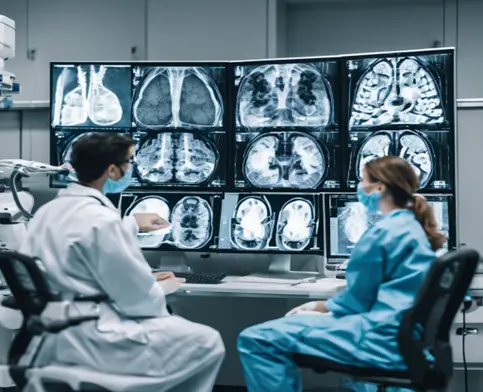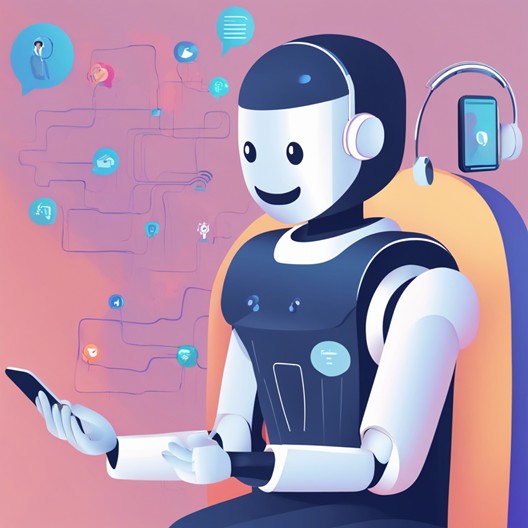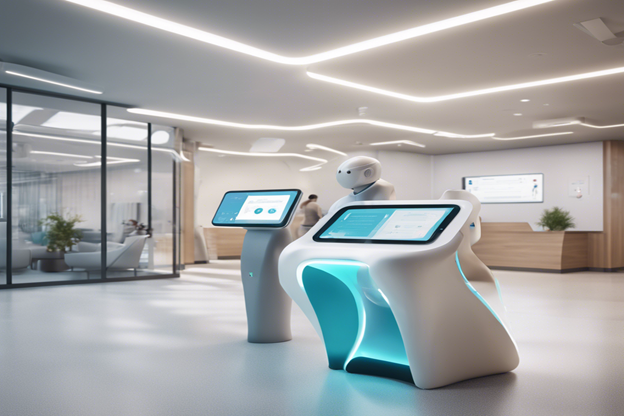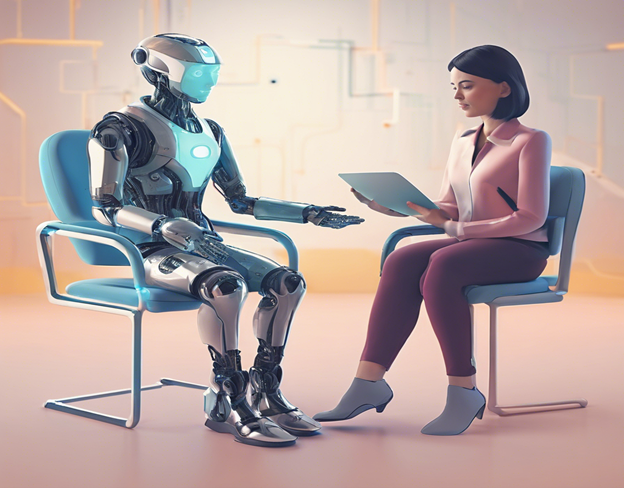AI depression tool: Artificial Intelligence is increasingly permeating every aspect of life. We are eagerly anticipating the increasing impact of AI on our daily lives. The AI can be used to assess the depression. This is a remarkable achievement. Every individual will check, by using the AI depression tool, how he is feeling, his anxiety, quality of life, and mood. AI depression tools bring change to the field of psychology. The psychiatrists will use AI depression tools to check the level of depression. Will the psychiatrists’ jobs disappear? Chatbots currently provide basic information about life patterns, but what if AI depression tools replace psychiatrists in the future?
Depression, Also Known As a Cold Illness
Depression is known as a common cold illness. Depression is an illness that hinders cognitive function and diverts attention from one’s daily routine. According to a report from the World Health Organization, every four people suffer from mental health disorders worldwide, with over 280 million suffering from this disorder. Another alarming sign in the world is that depression is highly prevalent among college and university students. According to the report, 24% of students suffer from depression. The other is the COVID-19 pandemic, which also brings more frustration and depression to the world.

The Medical Field Uses Machine Learning
In recent years, the medical field has made extensive use of machine learning techniques. Machine learning applications are utilized to identify illnesses and incorporate them into treatment plans. Such techniques need a database that interacts with the tool and makes a correlation between the medical features and outcomes. The machine learning detects the high level of risk to health. Machine learning is a subfield of AI. The algorithms train the data to produce an adaptable model that can perform a variety of complex tasks. The goal of AI is to complete the human task efficiently, whereas the goal of machine learning is to analyze the large volume of data.

Tools That Collect Depression Data
Specifically designed for early depression detection through social media content analysis, TAM-SenticNet is a neuro-symbolic AI framework. TAM-SenticNet overcomes the limitations of traditional diagnostic tools, particularly in terms of real-time responsiveness and interpretability (1). We use the NLP method to identify people who are depressed. Using computational linguistic approaches, Chabots and conversational agents interact with users and assist in promoting mental health. We used Latent Dirichlet allocation, the Social Media Depression Index (SMDI), and the Patient Health Questionnaire (PHQ-9) to detect depression symptoms in social media users. The Centre for Epidemiologic Studies Depression Scale (CES-D) develops a scale to measure the level of depression.

Emotional Elements and Depressive Words
Every individual’s reaction is different emotionally. The internal factors play a role in distracting the individual’s emotions, but the external factors play a significant role in distracting the individual’s emotions. If we understand that emotions consist of three components: the individual’s subjective feelings, the person’s behavior to express those feelings, and psychological effects, Depression is characterized by a depressed mood and a loss of interest. Depression also manifests as an eating disorder, energy loss, decreased activity, low self-esteem, and suicidal thoughts. Do you know what words make you depressed? These words are disinterest, depression, hopelessness, apathy, reluctance, overreacting, appetite, tiredness, fatigue, slowness, inactivity, restlessness, failure, inactivity, loser regret, inferiority, worthlessness, powerlessness, hopelessness, guilt, restlessness, confusion, concentration, hurt, death, and suicide.

AI Chatbots Like as Therapist
Mental health issues are on the rise worldwide. Depression, anxiety, and stress are more common than we acknowledge. Between 2007 and 2017, mental health conditions around the world rose by 13 percent. The pandemic made it even worse, but are there enough avenues for recourse? Can technology help? Apparently, Chat As therapists use AI, the number of bots is increasing. As a therapist, many people use the super-hit chatbot Chat GPT to discuss their issues and receive potential solutions. So what does a typical session look like? Say you typed the words, “I’m under stress or I’m having anxiety.” The AI tool will probably respond with something like this. I’m sorry to hear that you’re experiencing anxiety. It can be a challenging experience, but there are strategies.

A session with AI tools and solutions
You can attempt to manage your symptoms, starting with a conversation and then receiving a list of recommendations to guide you through the crisis. For instance, chat GPT may ask you to suggest talking to friends and family in case it’s not already obvious. A lot of this is also what a human counsellor will tell you in your initial sessions; it’s pretty basic stuff, but apparently, it helps so much that some people swear by the AI tool. They are prepared to replace their human therapist with the AI tool, but is this alternative advisable? It’s important to note that individuals with mental health issues may share commonalities in each case. Can chatbots really replace human counsellors? Chat GPT itself puts out a disclaimer. It says it’s not a replacement for a psychologist or counsellor, yet people turn to it because bot therapy is free, and that’s a major inducement given the fact that human therapists cost a lot for each session.

NHS England Is Testing AI Chatbots
As their mental health support waiting list grows, NHS England is testing AI chatbots to address complex emotional needs. As NHS mental health waiting lists grow, new startups are developing AI chatbot solutions. To reduce their mental health waiting list, the NHS is using the software. Limic, which works with a third of NHS Talk Therapies in England, provides assistance. The NHS trained an empathetic, 24/7 chatbot to accurately identify your main issues and what you want to focus on in therapy. We trust AI therapy. Data security is the first thing we need to know, but patient benefit is also important. You need to know that this is better than doing nothing or having chatbots replace therapists.

AI And Conventional Therapy
Individuals seeking support will grow as more of us talk to the AI’s database and understand communities, resulting in more reliance on artificial intelligence in our healthcare. Artificial intelligence (AI) has the potential to supplement and enhance conventional therapy. However, what’s particularly noteworthy is the recent implementation of the NHS’s innovative talking therapies programs across various parts of the NHS. Every month, 20,000 people in the UK are off work due to mental illness; a quarter of people and a quarter of patients seeking treatment wait more than 90 days. Depression and anxiety cause about 12 billion lost work days annually, and the pandemic has led to a 25% surge in general anxiety and depression, highlighting the severity of this issue.
A clinical trial of the AI Depression Tool
The department of psychiatry at Oxford University is testing a tool known as Petrushka. It would be a personalised antidepressant treatment. This tool leads the participant to play their role during the treatment process, and they can share their decision-making during the treatment process. In the summer, the team will do the trail with 200 participants, and the trail will involve more than 500 participants. It uses data from more than one million people and recommends, in real-time, the best antidepressants for each individual during a consultation. The entire trail will collect information from the participants about their mood, quality of life, and anxiety.

This is the article about the AI depression tool: What will be the future if the AI tool gives us an assessment of health? No doubt the world’s learning patterns are changing, and every individual might be a psychiatrist in the future by using such tools to know their mood, anxiety level, and depression. We are looking at how the department of psychiatry at Oxford University is testing a tool known as Petrushka. What will be the future results of this AI depression tool? I am thankful to my readers, whose comments and suggestions have given me strength to explore my thoughts in front of you. We are family, and I am looking forward.
Dr. Abid Hussain Nawaz
Post Doc, PhD, MPhil
References
Elyoseph, Z., Levkovich, I., & Shinan-Altman, S. (2024). Assessing prognosis in depression: comparing perspectives of AI models, mental health professionals and the general public. Family Medicine and Community Health, 12(Suppl 1).
Nguyen, H. V., & Byeon, H. (2023). Prediction of Parkinson’s disease depression using LIME-based stacking ensemble model. Mathematics, 11(3), 708.
Prama, T. T., Islam, M. S., Anwar, M. M., & Jahan, I. (2024). AI-Enabled Deep Depression Detection and Evaluation Informed by DSM-5-TR. IEEE Transactions on Computational Social Systems.
Togelius, J., & Yannakakis, G. N. (2024). Choose Your Weapon: Survival Strategies for Depressed AI Academics [Point of View]. Proceedings of the IEEE, 112(1), 4-11.
Zafar, F., Alam, L. F., Vivas, R. R., Wang, J., Whei, S. J., Mehmood, S., … & Nazir, Z. (2024). The Role of Artificial Intelligence in Identifying Depression and Anxiety: A Comprehensive Literature Review. Cureus, 16(3).




Good work Dr
“Dear Dr.Abid
Your insightful piece on AI Depression Tool: Our Future Psychiatrist has shed light on a groundbreaking innovation that has the potential to revolutionize mental health support. Your writing has not only raised awareness about this crucial topic but has also sparked hope for a future where technology and compassion converge to improve lives.
Your dedication to sharing knowledge and exploring cutting-edge solutions is truly commendable. You are helping shape a brighter tomorrow for those seeking mental wellness. Keep illuminating the path forward with your words!
I am feeling proud you Are my teacher